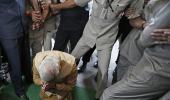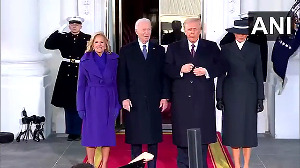In constitutional democracies the Opposition is legitimate and part of the legislature.
To see it as the enemy and to try and get rid of it through convictions and expulsions is not democratic, asserts Aakar Patel.

The problem of India's Parliament is the quality of debate, the lack of time spent discussing important legislation, the absence of quality for the most part in speeches, the chaos and anarchy, the horse-trading and the disregarding of Opposition and minority opinion.
A new building will solve none of these problems of course, but then it is not expected to.
Like the Vande Bharat trains, it is a solution to problems that do not exist.
And behind the introduction of new rituals is an absence of clarity or direction and the presence of theatre passing itself off as traditionalism. Let us see why.
Conservatism is described as the 'commitment to traditional values and ideas with opposition to change or innovation.'
What are traditional values? Those which are orthodox, long-established and customary.
The United Kingdom's parliament is in a building that goes back 900 years.
Fire destroyed a lot of the structure in 1263 in the reign of Henry III, then again in 1298 and again in 1512 and again in 1834.
Each time the parts that were burnt down were rebuilt.
This is traditionalism and conservatism and that is one reason why the House of the Commons and that of the Lords is so respected.
If you have seen parliamentary debate in the UK, with its stiff formalism and insistence on protocols and the members' discipline in following these it is because both parties accept traditionalism in these matters.
India's Parliament House was opened in 1927, but is being discarded in favour of something newer, though it is not clear why the new building is needed.
The inauguration is to be accompanied by religious ritual as a sign of belief in tradition but the larger principle of traditionalism was abandoned with the previous building.
Ideology must be rooted in principles. A focus on conservatism must then show itself across the spectrum of functioning.
This is not easy to do because it puts tradition and values above immediate advantage.
Traditionalism acts as a restraining hand on the wrist of the ruler.
It says go slow, do not disturb that which is working, respect what you have inherited and try to understand why it has worked.
Traditionalism also understands that there are boundaries, and the traditionalism respects them by adhering to these boundaries himself.
The often unwritten rules of engagement between institutions are followed by the traditionalist through convention and precedent, rather than innovation and invention.
Again, it needs to be repeated that this shows itself particularly where and when there is tension between institutions.
This is when the conservative, the traditionalist, steps back.
The radical individual knows all this and doesn't care for traditionalism or conservatism.
The goal here is to undo the past and to break with it totally.
Complete political and social reform is the call of the radical, also defined as extreme social and political change.
The current uncertainty with India's currency is not an act of conservatism or traditionalism.
It is a radical act, just like the one that inspired it in 2016.
Experimentation of this sort is not to be found in traditional governments like the UK, or even the US.
In those countries, people holding bills of high denomination have the confidence that their money will be accepted today, tomorrow and in the future.
'This note is legal tender for all debts, public and private' is what the dollar says.
Shopkeepers do not refuse the note in the US or the pound in the UK.
Traditionalism must extend to the Constitution and its values.
If it contains fundamental rights, meaning those which enjoy a high degree of protection from encroachment by the State then it is this value that must be echoed.
In constitutional democracies the Opposition is legitimate and part of the legislature.
To see it as the enemy and to try and get rid of it through convictions and expulsions is not traditionalist because it is not democratic.
The traditionalist treads carefully on laws that bring change. Especially change that is unclear.
If there are safeguards in law, then these must give pause.
Undoing parts of the Constitution for popular reasons or even those of nationalism is an act of radicalism.
Consider where Kashmir is today more than three years after executive action.
If it is in a place of uncertainty, it is because the action was not conservative or traditionalist.
When it is said that the party governing India is right wing, it is implied that it is traditionalist and conservative.
It is opposed to liberalism which wants to interpret laws based on the spirit of the time and not some eternal principles.
But this traditionalism does not appear to show itself in either language or behaviour.
It chases after the wrong things. And there will always be another new thing to chase.
Aakar Patel is a columnist and writer and you can read Aakar's earlier columns here.
Feature Presentation: Aslam Hunani/Rediff.com











 © 2025
© 2025